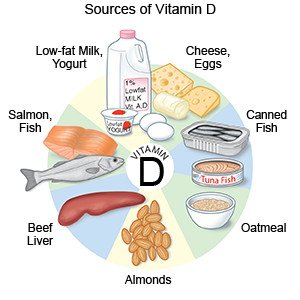Vitamin D Deficiency
Medically reviewed by Drugs.com. Last updated on Aug 4, 2025.
Vitamin D deficiency is a low level of vitamin D in your body. Vitamin D helps your body absorb calcium from foods. Your body makes vitamin D when your skin is exposed to sunlight. You can also get vitamin D from certain foods. Most of the vitamin D in your body comes from sunlight exposure.
DISCHARGE INSTRUCTIONS:
Call your doctor or dietitian if:
- You continue to have symptoms, or your symptoms get worse.
- You think you took too much of a vitamin D supplement, and you have nausea, vomiting, or a headache.
- You have questions or concerns about your condition or care.
Medicines:
- High-dose vitamin D supplements may be needed for 8 to 12 weeks to increase your levels. Your levels will then be rechecked. If your levels are still low, you will need to take vitamin D supplements for another 8 weeks. After your levels have gone back to normal, you may need to continue to take a vitamin D supplement.
- Take your medicine as directed. Contact your healthcare provider if you think your medicine is not helping or if you have side effects. Tell your provider if you are allergic to any medicine. Keep a list of the medicines, vitamins, and herbs you take. Include the amounts, and when and why you take them. Bring the list or the pill bottles to follow-up visits. Carry your medicine list with you in case of an emergency.
Related medications
Treatment options
The following list of medications are related to or used in the treatment of this condition.
Amount of vitamin D do you need each day:
The amount of vitamin D you need depends on your age. You may need more than the recommended amounts below if you take certain medicines or you have obesity. Ask your healthcare provider how much vitamin D you need.
- Infants up to 1 year of age: 400 international units (IU)
- Children 1 year and older: 600 IU
- Adults aged 19 to 70 years old: 600 IU
- Adults older than 70 years: 800 IU
Prevent vitamin D deficiency:
- Eat foods that are high in vitamin D. Fatty fish such as mackerel, canned tuna and sardines, and salmon are good sources of vitamin D. Eggs, almonds, and meat such as liver are also good sources. Certain foods such as milk, juice, and cereal are fortified with vitamin D.

- Give your breastfed infant a vitamin D supplement of 400 IU each day.
- Take vitamin D supplements as directed. High doses of vitamin D can be toxic. Your healthcare provider will tell you how much vitamin D you should take each day. Vitamin D is best absorbed when taken with food.
- Expose your skin to sunlight as directed. Ask your healthcare provider how you can safely expose your skin to sunlight and for how long. Too much exposure to sunlight can cause skin cancer.
Follow up with your doctor or dietitian as directed:
Write down your questions so you remember to ask them during your visits.
© Copyright Merative 2025 Information is for End User's use only and may not be sold, redistributed or otherwise used for commercial purposes.
The above information is an educational aid only. It is not intended as medical advice for individual conditions or treatments. Talk to your doctor, nurse or pharmacist before following any medical regimen to see if it is safe and effective for you.
Learn more about Vitamin D Deficiency
Treatment options
Care guides
Further information
Always consult your healthcare provider to ensure the information displayed on this page applies to your personal circumstances.
